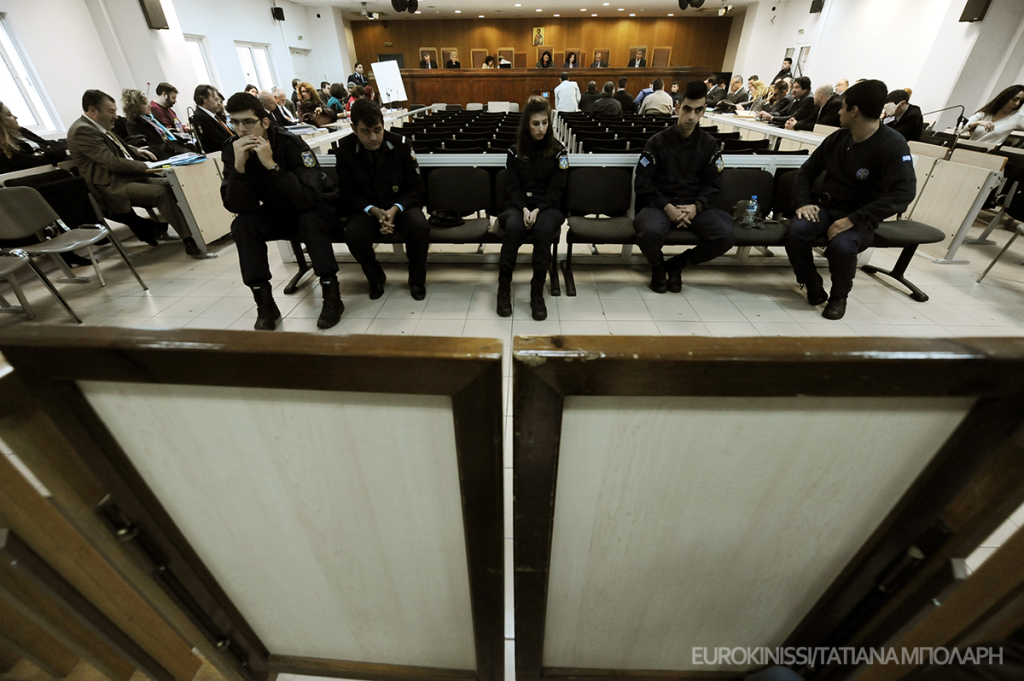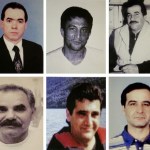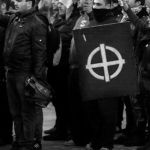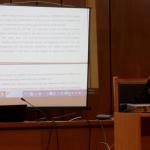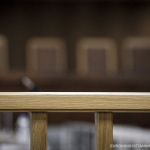39th Hearing, Women’s Section, Korydallos Prison, Athens, 16 December 2015
I. Court Access
Hearings remain open to members of the public, provided they present their identity cards at the entrance. The crowd was smaller than in the previous hearing. The spaces reserved for journalists are almost always occupied.
II. Presence and representation of the defendants
Eight (8) defendants were present; thirty-four (34) were registered as absent. The remaining defendants were represented by their counsel. Giorgos Roupakias’s counsel, Giorgos Roumpekas, was, once again, absent at the beginning of the hearing. The presiding judge, Maria Lepenioti, called a half-hour break. When the hearing resumed, the judge reprimanded the counsel and announced she would assign Roupakias’ defence to a counsel selected from the legal aid panel.
III. Testimony of Angeliki Legatou
The court then called on the 14th witness, police officer Angeliki Legatou, a member of the DIAS motorcycle police unit, to give evidence.
In summary, the witness’s testimony, which was given response to questions from the judge, was as follows: I have been part of the police force since 2008; I joined the DIAS motorcycle police in 2010. I trained in Nikea police station. On 17 September 2013, I was on my shift. There were two motorcycles in our unit: Tsolakidis and I rode on one, Bagios and Biankis on the other. Biankis and I both had walkie-talkies. Tsolakidis was heading the unit that night and was responsible for communicating with the station. At 23:55, we received a call from the station stating: “50 men carrying bats at the crossing of Ifigenias and Tsaldari streets; they are moving towards the Koralli bar.” We turned onto Kefallinias St because none of us knew where Ifigenias St was. When we got to the corner of Kefallinias and Pavlou Mela streets, we saw four or five people outside Koralli and another 40 to 50 lined up along the entire length of Mela St. They were wearing black; some of them wore helmets and some held objects, probably bats. A man approached us on his own initiative and told us that there had been a verbal clash between some Golden Dawners and a group of anarchists. He reassured us that the fight was over and that everyone would leave the scene. We didn’t see any anarchists. After this man (Dimitris Hatzistamatis) had reported the event to us, I handed the walkie-talkie to Tsolakidis, who told the station that a civilian had informed us of a fight between anarchists and Golden Dawners.
The Perama DIAS motorcycle police unit arrived. Deligiannis and Tzouvaras rode on one motorcycle; Koliousis and Rotas on another. Rotas and Tzovaras both had walkie-talkies. Deligiannis and I got off our bikes and approached the 40 to 50 people at the scene to get a better sense of their intentions. We didn’t get the chance to ask them. Some 15 or 20 of them started to run; we followed them to see where they were going. They started to curse. They shouted, “There they are! Come here, you bastards!” But I couldn’t tell whom they were shouting at; we couldn’t see another group. They were running from Kefallinias to Tsaldari streets. Deligiannis and I followed them; I don’t know what our colleagues did. Tsolakidis took down Hatzistamatis’s details.
Responding to a question from the presiding judge, the witness admitted that she didn’t think it was right for Tsolakidis to take the time to note down Hatzistamatis’s details as all this was going on. She continued: Everything happened so quickly. As I ran after the men, a woman approached me from the sidewalk. The stopped me and said. “Go there! They are beating up my friends”. We ran, we shouted out, “Police! Stop!” They ignored us; they even ran ahead of us. When we got to Tsaldari St, we saw more people. It was total chaos: people were shouting, people were running from every direction. We couldn’t figure out why they were shouting or at whom. There were more than 15 to 20 people; there were more men in black – I imagine they must have been together. At 62 Tsaldari St, I saw four to five people fighting – beating each other. The other people dispersed. Deligiannis and I were screaming; they ignored us. Deligiannis tried to grab hold of someone, but another, taller man pushed him away. Only Pavlos Fyssas and Roupakias were left behind.
When the presiding judge asked her whether she felt she had done everything she should to prevent the incident, the witness responded that the police had done everything they could: in spite of the station’s orders not to intervene, but rather to stay on the scene and report on events back to the station, they followed the men and arrested Roupakias. There were eight policemen to fifty people. The station should have sent in more units, like the Delta (rapid response unit) or MAT and YMET (riot police) squads. No one could have predicted what happened. When they saw the 50 men, they called for backup; they did everything they could. The judge insisted, asking again what the police’s presence had actually achieved; a man died and only one man was arrested out of 40 or 50. The witness responded that the defendant (Roupakias) would have escaped had the police not been on the scene. Again, the judge pressed on the question of what the police could have done, suggesting that they might have fired shots in the air to frighten the people away. The witness responded that they could not have drawn arms; nor was firing into the air among so many people an option. She repeated that the police did the best they could.
“The only people left at the scene were Deligiannis, Fyssas, Roupakias and I. We tried to separate them and pulled Fyssas back. They were cursing at each other, but we couldn’t make out what they were saying. I had noticed a car illegally parked nearby, but I didn’t see anyone sitting in it or getting out of it. I pulled Fyssas back because he seemed the more agitated of the two. I told him to cut it out. He turned to me and shouted, ‘You’re talking to me?’ He pulled up his shirt; we saw the stab wound. He pointed to the man who had knifed him. I turned and saw Roupakias approach his car; he was calm, he wasn’t running. Rotas and Tsolakidis got him out of the car. No one tried to prevent his arrest, nor did anyone hit us.”
At this point, the judge asked a series of questions regarding what the police should or could have done to prevent the what had happened. She commented that the witness’s colleagues had stayed behind because they did not wish to get involved and, as a result, they left civilians unprotected. Responding to further questions from the judge, the witness said that the four or five people she saw fighting gave her the impression that there were four men against Fyssas. She denied having uttered the phrase “no, not with knives”. She said she took off her helmet when she crossed Tsaldari St, adding that though it bothered her and compromised her vision, she hadn’t had a moment to take it off earlier. She added that she had felt afraid and that she knew of other Golden Dawn attacks, such as the one on the PAME trade unionists or others on migrants. She testified that Golden Dawners operate in units and that they have some form of hierarchy. Moreover, she said that the men had buzz cuts and were strongly built. She has heard the slogan “Blood, Honour, Golden Dawn” and of district leaders and cell leaders. Returning to the assault itself, the witness testified that the four or five people looked as though they intended to trap Fyssas and to hold him back in order to facilitate Roupakias. They all wore black and seemed to know each other. Again, the judge asked the witness whether the police did everything they could to prevent the murder. The witness responded, “what can I say…”. The judge answered, “What can you say? What can you say?”
Responding to questions from the prosecutor, Adamantia Oikonomou, the witness said that Roupakias was not wounded and that she hadn’t seen him hold or throw anything away. She had only seen him walk towards his car and open the door. She remarked that the weapon was “such a small knife”. She added that Roupakias did not have a passenger in the car; that she saw no one get out of the car; that she had never seen a Golden Dawn march; that she had no involvement in the attacks on PAME; that she didn’t hear anyone give orders that night.
Responding to questions from the deputy prosecutor, Stelios Kostarellos, the witness testified that the 50 men carrying bats had frightened her, given she had never been present at an incident resulting in murder before. Surveying the room, she recognised only Roupakias. She stated that she saw nothing wrong in the phrase “No, not with knives” but added that she had never uttered it – nor would she. The deputy prosecutor asked her whether she got the sense that the group had coordinated in advance. She replied that they all ran towards the same place and so may have agreed on a plan of action before the event, arranging to run towards Tsaldari St, where Fyssas was.
IV. Testimony of Angeliki Legatou: cross-examination by civil counsel
Andreas Tzelis (for the Fyssas family) began cross-examination of the witness by the civil counsel and asked her what kind of training she had received. She responded that she had been trained to deal with armed robberies, burglaries and risk control. Following further questions from the counsel, the witness testified that the police did not arrest any of the people carrying clubs because they didn’t see them committing any crimes; that they chased the 15 to 20 people; that she herself was afraid as she didn’t know what would happen at the end of the alleyway; that she was afraid throughout the incident; that the woman who asked for her help was very agitated; that she didn’t see her again until the incident was over; that she did not think to take off her helmet (she felt safer wearing it); that they were given orders to arrest anyone wearing black and out of breath.
Responding to questions from civil counsel Ellada Christodoulou (for the Fyssas family), the witness testified that the police grabbed hold of Fyssas because he seemed to be the more aggressive party and that Roupakias could not have escaped given there were other policemen there.
However, responding to questions from civil counsel Violetta Kougiatsou (for Magda Fyssa), the witness admitted that Roupakias could, perhaps, have escaped if Fyssas had not pointed him out to them. Moreover, the witness said she did not know whether Fyssas had been attacked earlier and that what she saw – four men against one – qualifies (in police terms) as a quarrel or an incident involving many individuals. Again, the judge interjected and asked the witness why the police did not grab hold of Roupakias (as well as or instead of Fyssas). The witness replied that they didn’t see Roupakias do anything.
Responding to questions from civil counsel Chrysa Papadopoulou (for Irini Fyssa), the witness said that eight people could not possibly engage in a fight against 50. Here, the judge intervened, saying, “what we don’t understand is what should have happened. These are not solutions. Do you mean to say that whenever a civilian finds himself in a dangerous situation, they should count how many assailants are facing them?” Again, the witness insisted that the police had done everything they could and that they had asked for backup. Continuing her response to counsel Papadopoulou, the witness testified that she realized the men were Golden Dawners. Moreover, when she approached 62 Tsaldari St, she realized that four men were assaulting one – in other words, that Fyssas was the victim and that the fact that the men were uniformly dressed meant they were acting together.
Responding to questions from counsel Eleftheria Tompatzoglou (for the Fyssas family), the witness testified that Roupakias’ car was stationary; that her colleagues had to stay behind to watch the motorcycles; that she only found out about Golden Dawn’s hierarchy and its various attacks after the murder; that she has not heard the slogan “a knife in the heart of every antifascist”.
Responding to questions from civil counsel Takis Zotos (for the Egyptian fishermen), the witness testified that she could tell that the people were Golden Dawners because they were uniformly dressed; that she didn’t know what happened to the other 40 to 50 people; that it is not usual for 50 Golden Dawners to assemble somewhere in the middle of the night; that she was too focused on Roupakias and Fyssas to notice whether there were other people gathered around 62 Tsaldari St; that she didn’t see the women on the bench or remember a couple walking their dog; nor did she see anyone wounded nearby.
Finally, following questions from civil counsel Thanasis Kampagiannis (for the Egyptian fishermen), the witness said that a Perama police unit could have been following them without her realising it. She added that the police station’s call had been correct, given it corresponded to what they saw.
At this point, the court adjourned until 9am on Thursday, 17 December 2015. This hearing will continue with Kampagiannis’ cross-examination of the witness.

